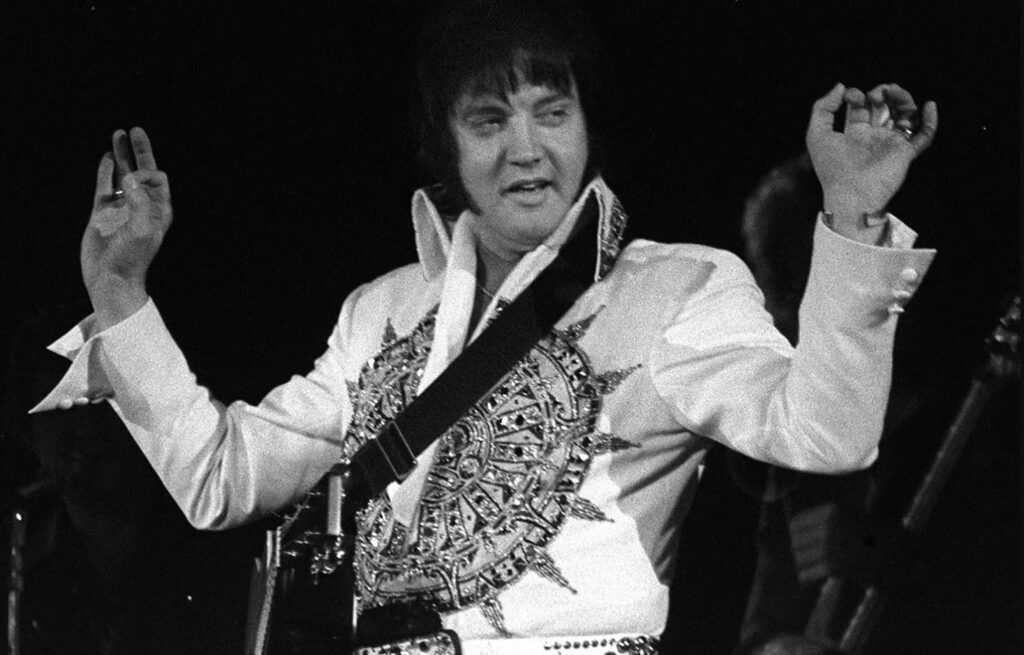
Elvis Presley and “Jailhouse Rock”: A Lasting Legacy in His Final Performance
In the twilight of his legendary career, Elvis Presley delivered a performance that would etch itself into the annals of music history, resonating with the power and poignancy that only the King of Rock ‘n’ Roll could muster. “Jailhouse Rock,” a song that had long since become synonymous with his dynamic stage presence and unique vocal prowess, took on an even deeper significance during his final performance in June 1977. As the curtains drew to a close on that fateful evening, Elvis left behind not just a melody, but a legacy—a testament to his enduring influence and the indelible mark he left on popular culture.
When “Jailhouse Rock” first burst onto the scene in 1957, it was an instant sensation. The song quickly climbed to the top of the charts, securing its place as a number-one hit on the Billboard Hot 100. It was more than just a commercial success; it was a cultural phenomenon. With lyrics penned by the legendary duo Jerry Leiber and Mike Stoller, and featuring Elvis’s unmistakable voice, “Jailhouse Rock” captured the rebellious spirit of a generation eager to break free from societal constraints. The accompanying film of the same name further cemented its status, showcasing Elvis’s charismatic screen presence and iconic dance moves.
Fast forward two decades, and the world had changed dramatically. Yet, as Elvis took to the stage in 1977, there was a sense of nostalgia in the air—a yearning for those simpler times when rock ‘n’ roll was young and full of promise. For many in the audience, this performance was not just about reliving past glories; it was about reconnecting with their own youth and the memories that “Jailhouse Rock” had soundtracked. It was a song that had seen them through teenage rebellions and first loves, one that had played on jukeboxes across America as they danced away their cares.
The story behind this final rendition is steeped in both triumph and tragedy. By 1977, Elvis had faced numerous personal challenges—his health was declining, and he struggled with the pressures of fame. Yet, despite these obstacles, he remained committed to his craft. This performance was part of his last tour, a series of concerts that demonstrated his unwavering dedication to his fans. On stage, as he belted out “Jailhouse Rock,” there was a raw authenticity to his delivery—a glimpse into the soul of an artist who had given everything to his music.
The meaning of “Jailhouse Rock” transcends its lyrics about prison life and rebellion; it speaks to freedom in all its forms—the freedom to express oneself, to defy expectations, and to live life on one’s own terms. In this final performance, Elvis encapsulated all these themes with an intensity that spoke volumes about his own journey. It was as if he was saying goodbye not just to his audience, but to an era—a farewell wrapped in melody and memory.
For those who were fortunate enough to witness this moment live or have since watched it through recordings, it’s clear that this wasn’t merely another concert—it was a poignant chapter in music history. As we reflect on Elvis Presley’s legacy and listen once more to “Jailhouse Rock,” we’re reminded of the joy and exuberance he brought into our lives. His voice continues to echo through time, inviting us to dance once more—to remember who we were when we first heard him sing—and perhaps most importantly, to cherish every note as if it were our last.
In remembering Elvis Presley’s final performance of “Jailhouse Rock,” we celebrate not just a song or an artist, but an enduring connection between generations—a shared experience that unites us across time through rhythm and rhyme.